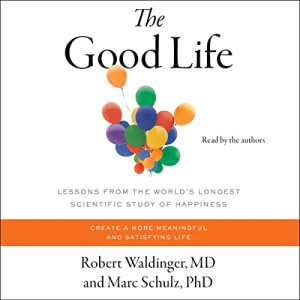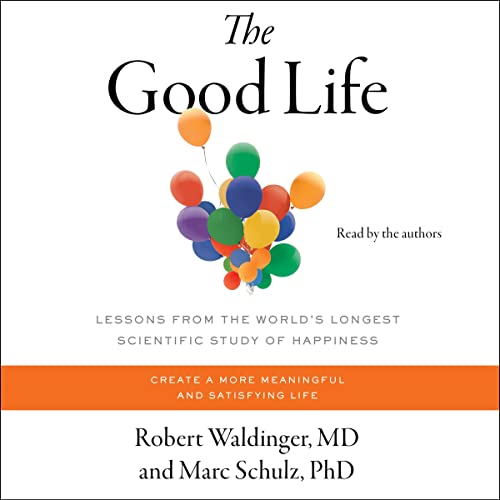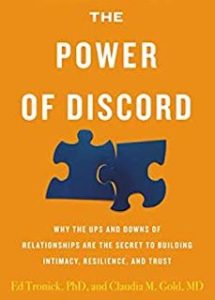 The Good Life: Lessons from the World’s Longest Scientific Study of Happiness serves as a warm and guiding light, steering us towards a more meaningful and inspiring existence. Robert Waldinger and Marc Schulz, director and co-director, weave together narratives and insights from their extraordinary 84-year-long Harvard Study of Adult Development. This study, spanning three successive generations of participants, not only encompasses the lives of the initial 724 individuals but extends its reach to encompass the stories of 1,300 of their descendants. Rather than showcasing exceptional figures and role models, this book delves into the lives of relatable, everyday people, unveiling the specialness inherent in our interconnectedness. Bursting with relatable anecdotes and enlightening discoveries, the book offers a refreshing take on the true sources of happiness.
The Good Life: Lessons from the World’s Longest Scientific Study of Happiness serves as a warm and guiding light, steering us towards a more meaningful and inspiring existence. Robert Waldinger and Marc Schulz, director and co-director, weave together narratives and insights from their extraordinary 84-year-long Harvard Study of Adult Development. This study, spanning three successive generations of participants, not only encompasses the lives of the initial 724 individuals but extends its reach to encompass the stories of 1,300 of their descendants. Rather than showcasing exceptional figures and role models, this book delves into the lives of relatable, everyday people, unveiling the specialness inherent in our interconnectedness. Bursting with relatable anecdotes and enlightening discoveries, the book offers a refreshing take on the true sources of happiness.
In an era where the pursuit of productivity, efficiency, focus, and optimization dominates, this book provides a gentle yet uplifting reminder of our genuine human essence. Amidst our efforts, it offers us a chance to recognize the invaluable treasure of building strong bonds with loved ones, friends, and our community.
The authors skillfully contextualize the Harvard Study, elevating it beyond a mere collection of anecdotes. Drawing from both the ancient wisdom of Plato and Seneca to contemporary fMRI studies that explore the neuroscience of holding hands, the authors blend philosophy with modern neuropsychology to illuminate the stories they share. Their synthesis spans the ages, offering scientifically substantiated pathways to enlivening and imbuing our lives with meaning.
Connections are not solely confined to finding romantic love or creating the quintessential family. Happiness is not exclusive to a singular type of relationship; rather, it is a rich tapestry of connections—friendships, family ties, fleeting conversations with colleagues, or shared smiles with strangers. It encourages us to value the everyday interactions that often go unnoticed amidst our pursuit of personal betterment. Through the lens of this book, we uncover diverse avenues to recognize and cultivate happiness in every facet of our lives.
While loaded with advice and heuristics, this is not a mere sprinkle of friendly advice. The book emphasizes that relationships require genuine care and effort, as well as self-awareness. While opportunities for connections abound, they necessitate deliberate action and appreciation. The reader is gently prompted to introspect, cherish, and invest in the relationships that light up their existence. Through the experiences of the study participants, the book underscores the rewards and fulfillment that blossom from nurturing these precious bonds.
Symbiotic relationship between the heart and health are also highlighted in the examinations of correlations between vibrant relationships and overall well-being. In a world grappling with isolation, the book delivers a heartfelt message: prioritize the connections that set your heart aglow. Beyond interpersonal bonds, the book delves into an array of ingredients that enhance the recipe for happiness. From uncovering our life’s purpose to sprinkling gratitude into our daily routines, and tending to our mental and physical health, it offers a delectable menu for a richer, more fulfilling existence.
While presenting novel insights, the book also holds up a mirror to our oversights—reminding us of our unmet needs and those of others. Reading this book invites moments of pause and self-reflection, prompting us to recognize the simple yet overlooked aspects of life that warrant our attention.
Sit down with Robert and Marc over a cup of coffee as they share the wisdom gleaned from delving into the ebbs and flows of hundreds of lives. “The Good Life” encapsulates that very conversation—brimming with laughter, sagacity, and shared experiences. It reiterates that happiness isn’t a distant career aspiration requiring years of toil and sacrifice; rather, it resides in the connections we nurture and the moments we cherish today.





